Department of Medicine Wheels Up Early Physician Scientist Career Development Program

Program Description
The Wheels Up Program is designed to identify promising early physician scientists, and to support them in their transition from clinical training to independence. The program is structured around three pillars:
- Adequate protected time for research.
- Salary support in line with an Assistant Professor in the awardee’s specialty.
- Mentorship (Peer, Scientific, and Professional)
The Wheels Up program will help support candidates within the DoM who are working towards their first R21/01 (or equivalent) award. The ideal candidates could be one of the following:
- Have one to two years of post‐clinical training.
- Have a career development award.
- Be a faculty member who will be applying for their first R21/01 or similar award.
Each Division Head within the Department of Medicine is eligible to nominate one faculty candidate to be considered for the program per funding cycle. Candidates are expected to be in the program for a minimum of one year.
Each awardee will develop an individual mentoring committee, and will be required to participate in DOM sponsored activities such as a research conferences, meetings, and early investigator workshops as they become available.
To request application materials please contact Liz Veasey veaseye@ohsu.edu.
Program Contacts
David Lewinsohn, MD
DoM Vice Chair of Research
Liz Veasey, M.H.A.
Associate Vice Chair of Administration
Current Wheels Up Awardees
Fiscal Year 2024

This web page is currently under construction. Please check back later for updates
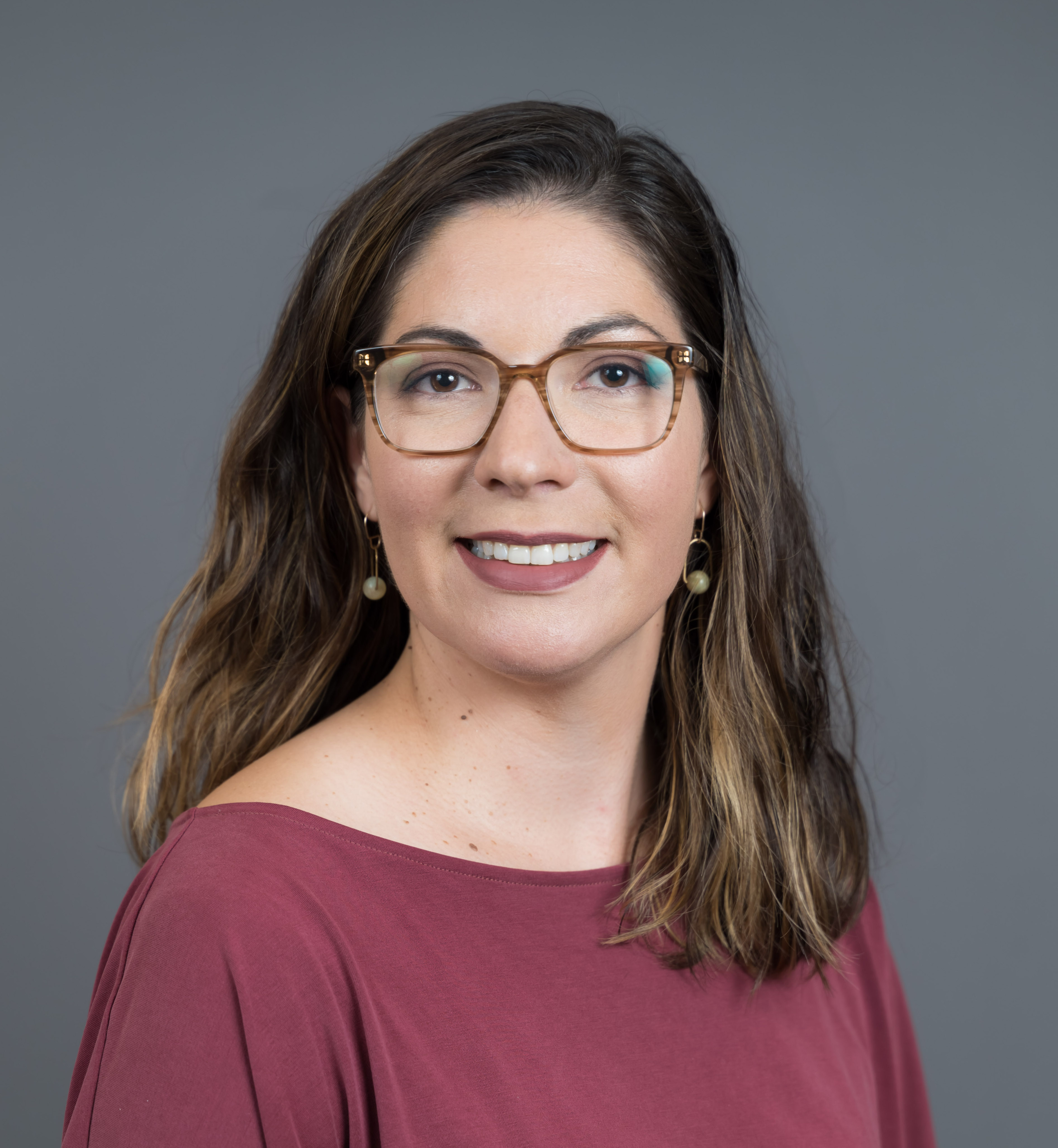
This web page is currently under construction. Please check back later for updates
Fiscal Year 2023

Dr. Hope is a physician scientist whose long-term goal is to develop an independent research program focused on improving the recovery of adults after acute illnesses such as pneumonia, acute respiratory failure and sepsis. His research aims to: 1) understand the pre-hospital and hospital factors that may be relevant to adverse outcomes in adult survivor of acute illnesses; 2) develop and test interventions to improve these long-term morbidity outcomes in adult survivors of acute illnesses. Dr. Hope’s NHLBI career development award focuses on the interconnection between physical and cognitive impairments in survivors of acute respiratory failure. The phenomenon of cognitive motor interference, how mobility performance changes with the addition of a concurrent cognitive task, has been studied as a risk stratification tool for the early identification of older adults at risk for adverse outcomes. Dr. Hope’s current research focuses on developing and validating novel approaches for measuring cognitive motor interference in adult survivors of acute respiratory failure with the hope that such tools may facilitate the early identification of adult survivors of acute respiratory failure who may benefit from early rehabilitation interventions that can improve their physical and cognitive outcomes.
Dr. Hope is one of the founding and executive committee members of the Critical and Acute Illness Recovery Organization (CAIRO), a global collaborative of clinicians, researchers and survivors committed to improving long-term outcomes in survivors of acute illness. He was the founding director of the COVID-19 Recovery Engagement Clinic (CORE) at Montefiore-Einstein before moving to Oregon Health and Science University (OHSU) to be an Associate Professor within the Division of Pulmonary/Critical Care Medicine. As the Medical Director of the OHSU Long COVID program, Dr. Hope is also interested in best approaches to structure after-care programs for adults with post-acute sequelae of SARS-CoV-2 infection (PASC).
Recent publications:
- Haines KJ, Hibbert E, Leggett N, Boehm LM, Hall T, Bakhru RN, Bastin AJ, Butcher BW, Eaton TL, Harris W, Hope AA, Jackson J, Johnson A, Kloos JA, Korzick KA, Mactavish P, Meyer J, Montgomery-Yates A, Quasim T, Slack A, Wade D, Still M, Netzer G, Hopkins RO, Iwashyna TJ, Mikkelsen ME, McPeake J, Sevin CM; Society of Critical Care Medicine’s Thrive initiative. Transitions of Care After Critical Illness-Challenges to Recovery and Adaptive Problem Solving. Crit Care Med. 2021
- Han JH, Ginde AA, Brown SM, Baughman A, Collar EM, Ely EW, Gong MN, Hope AA, Hou PC, Hough CL, Iwashyna TJ, Jackson JC, Khan A, Orun OM, Patel MB, Raman R, Rice TW, Ringwood N, Semler MW, Shapiro NI, Talmor DS, Self WH; Vitamin D to Improve Outcomes by Leveraging Early Treatment Network Investigators. Effect of Early High-Dose Vitamin D3 Repletion on Cognitive Outcomes in Critically Ill Adults. Chest. 2021
- McPeake J, Iwashyna TJ, Boehm LM, Hibbert E, Bakhru RN, Bastin AJ, Butcher BW, Eaton TL, Harris W, Hope AA, Jackson J, Johnson A, Kloos JA, Korzick KA, Meyer J, Montgomery-Yates A, Mikkelsen ME, Slack A, Wade D, Still M, Netzer G, Hopkins RO, Quasim T, Sevin CM, Haines KJ. Benefits of Peer Support for Intensive Care Unit Survivors: Sharing Experiences, Care Debriefing, and Altruism. Am J Crit Care. 2021 Mar 1;30(2):145-149.
- Hope AA, Enilari OM, Chuang E, Nair R, Gong MN. Prehospital Frailty and Screening Criteria for Palliative Care Services in Critically Ill Older Adults: An Observational Cohort Study. J Palliat Med. 2021 Feb;24(2):252-256
- Hope AA, Chen JT, Kaufman DA, Talmor DS, Kor DJ, Gajic O, Gong MN. The Association between Prehospital Vulnerability, ARDS Development, and Mortality among At-Risk Adults. Results from the LIPS-A Clinical Trial. Ann Am Thorac Soc. 2019 Nov;16(11):1399-1404.
- Hope AA, Law J, Nair R, Kim M, Verghese J, Gong MN. Frailty, Acute Organ Dysfunction, and Increased Disability After Hospitalization in Older Adults Who Survive Critical Illness: A Prospective Cohort Study. J Intensive Care Med. 2020 Dec;35(12):1505-1512
Dr. Brian Chan is an assistant professor of medicine at OHSU Department of Medicine, division of general internal medicine and geriatrics and addiction medicine section. His primary research interest is to develop and evaluate clinical innovations to improve care for medically and socially complex patients, including those with substance use disorders. He conducts community partnered research with Central City Concern, a nationally recognized healthcare for the homeless Federally Qualified Health Center, and employs clinical trial, observational, and qualitative research methods. He is currently the recipient of an Agency for Healthcare Research and Quality (AHRQ) Patient Centered Outcomes Research (PCOR) K12 award to evaluate a novel integrated primary care model (SUMMIT) to improve outcomes for medically and socially complex patient populations with substance use disorder. His career goal is to develop methods for using readily available data to inform targeting and development of clinical interventions to improve substance use care for complex patients, and has submitted a career development award to the National Institutes of Health (NIH) to support his transition to research independence.
Selected publications:
- Chan B, Edwards ST, Nicolaidis C, Kansagara D, Korthuis T, Saha S. The SUMMIT Ambulatory-ICU Primary Care Model for Medically and Socially Complex Patients in an Urban Federally Qualified Health Center: Study Design and Rationale. Addiction Science and Clinical Practice: 2018 Dec. 2018 Dec; 13(1):27 PMCID: PMC6295087
- Chan B, Hulen E, Edwards ST, Mitchell M, Nicolaidis C, Saha S. “It’s Like Riding Out the Chaos”: Perspectives of Clinicians and Staff on Caring for High-Needs, High-Cost Patients in the SUMMIT Ambulatory Intensive Care Trial. Annals of Family Medicine: 2019 Nov; 17(6):495-501 PMCID: PMC6846277
- Chan B, Goldman L, Sarkar U, Guzman D, Critchfield J, Saha S, Kushel M. High perceived social support protects against 30-day hospital readmission in a multi-ethnic, limited english proficiency, safety-net population. BMC Health Services Research: 2019 May; 19(1): 334. PMCID: 6534878
- Chan B, Kondo K, Ayers C, Freeman M, Montgomery J, Paynter R, and Kansagara D. Pharmacotherapy for methamphetamine/amphetamine use disorder- a systematic review and meta-analysis. Addiction: 2019 Jul 22 [Epub ahead of print]. PMID:31328345
Fiscal Year 2022
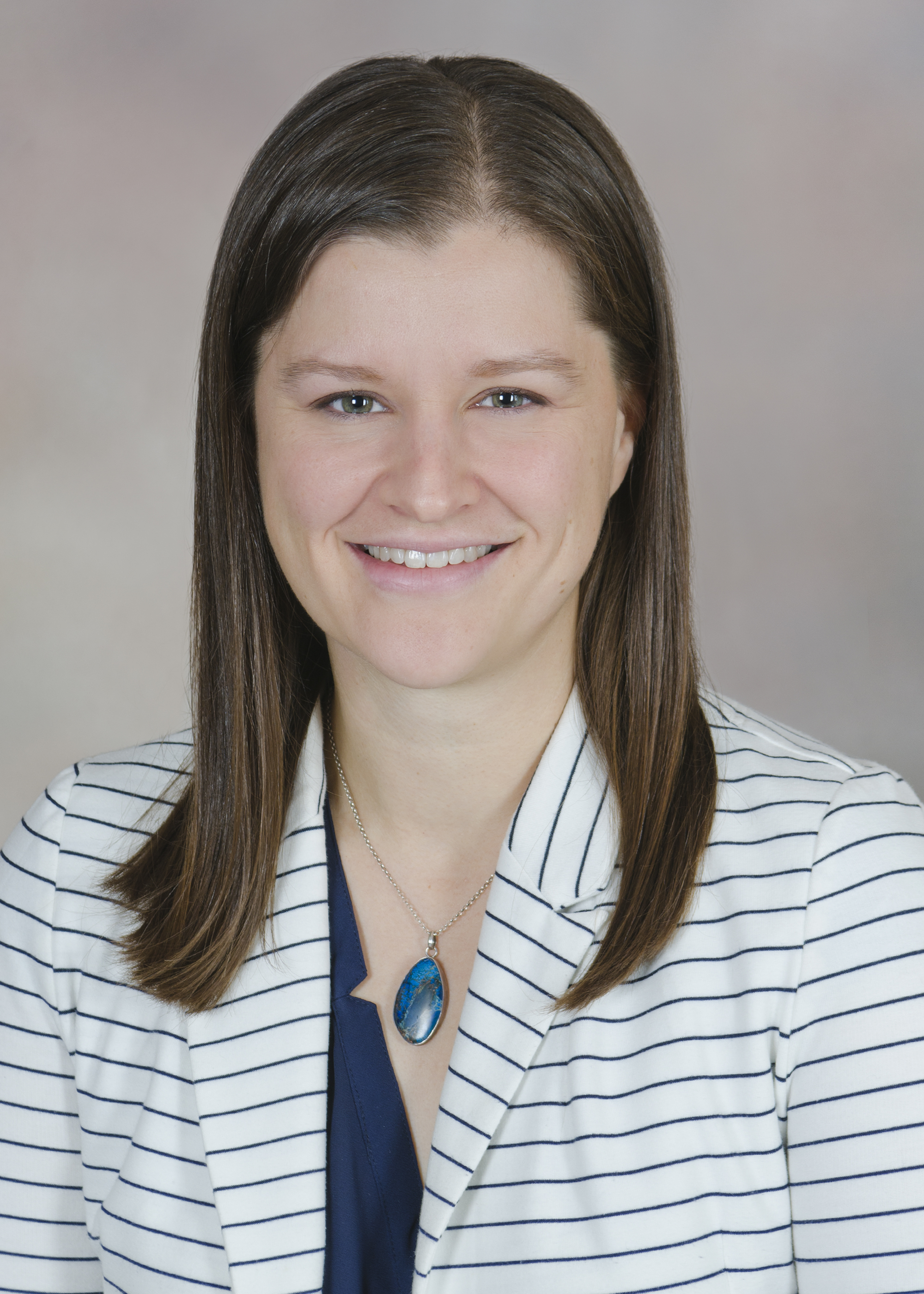
Research Summary:
Dr. Leah M. Wilson is an Assistant Professor in the Department of Medicine, Division of Endocrinology at Oregon Health & Science University. Her research is focused on diabetes technologies for patients with type 1 diabetes including multi-hormonal (insulin with pramlintide or glucagon) automated insulin delivery systems and smartphone-based decision support applications. Several artificial pancreas systems are now commercially available. However, these systems continue to bear significant burden on people with type 1 diabetes including the requirement of meal announcement and still do not provide optimal glucose control for daily occurrences such as meals and physical activity. She is involved in several collaborative research projects funded through National Institutes of Health (NIH)
working on solutions to improve Type 1 Diabetes technologies including expertise in endocrinology, physiologic modelling, artificial intelligence, and computer engineering. Dr. Wilson’s most recent project involves the development a new dual hormone (insulin and pramlintide), fully automated closed loop system that can automatically detect meals and dose insulin in response to these meals. By combining the slowed gastric emptying and suppression of endogenous glucose production that pramlintide provides with a meal detection algorithm, the goal is a fully automated closed loop system with minimal patient burden to achieve substantial improvements in glycemic control both during the evening and during the day. She also sees patients at the Harold Schnitzer Diabetes Health Center and in the Endocrinology Clinic at OHSU treating patients with type 1, type 2 diabetes as well as general endocrine conditions.
References:
- Nguyen TP, Jacobs PG, Castle JR, Wilson LM, Kuehl K, Branigan D, Gabo V, Guillot F, Riddell MC, Haidar A, El Youssef J. Separating insulin-mediated and non-insulin-mediated glucose uptake during and after aerobic exercise in type 1 diabetes. Am J Physiol Endocrinol Metab. 2021 Mar 1;320(3):E425-E437. doi: 10.1152/ajpendo.00534.2020. Epub 2020 Dec 28. PubMed PMID: 33356994; PubMed Central PMCID: PMC7988786.
- Wilson LM, Castle JR. Recent Advances in Insulin Therapy. Diabetes Technol Ther. 2020 Dec;22(12):929-936. doi: 10.1089/dia.2020.0065. Epub 2020 May 12. PubMed PMID: 32310681; PubMed Central PMCID: PMC7864088.
- Wilson LM, Tyler N, Jacobs PG, Gabo V, Senf B, Reddy R, Castle JR. Patient Input for Design of a Decision Support Smartphone Application for Type 1 Diabetes. J Diabetes Sci Technol. 2020 Nov;14(6):1081-1087. doi: 10.1177/1932296819870231. Epub 2019 Aug 23. PubMed PMID: 31441336; PubMed Central PMCID: PMC7645130.
- Wilson LM, Jacobs PG, Ramsey KL, Resalat N, Reddy R, Branigan D, Leitschuh J, Gabo V, Guillot F, Senf B, El Youssef J, Steineck IIK, Tyler NS, Castle JR. Dual-Hormone Closed-Loop System Using a Liquid Stable Glucagon Formulation Versus Insulin-Only Closed-Loop System Compared With a Predictive Low Glucose Suspend System: An Open-Label, Outpatient, Single-Center, Crossover, Randomized Controlled Trial. Diabetes Care. 2020 Nov;43(11):2721-2729. doi: 10.2337/dc19-2267. Epub 2020 Sep 9. PubMed PMID: 32907828.
- Tyler NS, Mosquera-Lopez CM, Wilson LM, Dodier RH, Branigan DL, Gabo VB, Guillot FH, Hilts WW, El Youssef J, Castle JR, Jacobs PG. An artificial intelligence decision support system for the management of type 1 diabetes. Nat Metab. 2020 Jul;2(7):612-619. doi: 10.1038/s42255-020-0212-y. Epub 2020 Jun 1. PubMed PMID: 32694787; PubMed Central PMCID: PMC7384292.
- Wilson LM, Jacobs PG, Castle JR. Role of Glucagon in Automated Insulin Delivery. Endocrinol Metab Clin North Am. 2020 Mar;49(1):179-202. doi: 10.1016/j.ecl.2019.10.008. Epub 2019 Dec 10. Review. PubMed PMID: 31980117; PubMed Central PMCID: PMC7398489.

Dr. Hope is a physician scientist whose long-term goal is to develop an independent research program focused on improving the recovery of adults after acute illnesses such as pneumonia, acute respiratory failure and sepsis. His research aims to: 1) understand the pre-hospital and hospital factors that may be relevant to adverse outcomes in adult survivor of acute illnesses; 2) develop and test interventions to improve these long-term morbidity outcomes in adult survivors of acute illnesses. Dr. Hope’s NHLBI career development award focuses on the interconnection between physical and cognitive impairments in survivors of acute respiratory failure. The phenomenon of cognitive motor interference, how mobility performance changes with the addition of a concurrent cognitive task, has been studied as a risk stratification tool for the early identification of older adults at risk for adverse outcomes. Dr. Hope’s current research focuses on developing and validating novel approaches for measuring cognitive motor interference in adult survivors of acute respiratory failure with the hope that such tools may facilitate the early identification of adult survivors of acute respiratory failure who may benefit from early rehabilitation interventions that can improve their physical and cognitive outcomes.
Dr. Hope is one of the founding and executive committee members of the Critical and Acute Illness Recovery Organization (CAIRO), a global collaborative of clinicians, researchers and survivors committed to improving long-term outcomes in survivors of acute illness. He was the founding director of the COVID-19 Recovery Engagement Clinic (CORE) at Montefiore-Einstein before moving to Oregon Health and Science University (OHSU) to be an Associate Professor within the Division of Pulmonary/Critical Care Medicine. As the Medical Director of the OHSU Long COVID program, Dr. Hope is also interested in best approaches to structure after-care programs for adults with post-acute sequelae of SARS-CoV-2 infection (PASC).
Recent publications:
- Haines KJ, Hibbert E, Leggett N, Boehm LM, Hall T, Bakhru RN, Bastin AJ, Butcher BW, Eaton TL, Harris W, Hope AA, Jackson J, Johnson A, Kloos JA, Korzick KA, Mactavish P, Meyer J, Montgomery-Yates A, Quasim T, Slack A, Wade D, Still M, Netzer G, Hopkins RO, Iwashyna TJ, Mikkelsen ME, McPeake J, Sevin CM; Society of Critical Care Medicine’s Thrive initiative. Transitions of Care After Critical Illness-Challenges to Recovery and Adaptive Problem Solving. Crit Care Med. 2021
- Han JH, Ginde AA, Brown SM, Baughman A, Collar EM, Ely EW, Gong MN, Hope AA, Hou PC, Hough CL, Iwashyna TJ, Jackson JC, Khan A, Orun OM, Patel MB, Raman R, Rice TW, Ringwood N, Semler MW, Shapiro NI, Talmor DS, Self WH; Vitamin D to Improve Outcomes by Leveraging Early Treatment Network Investigators. Effect of Early High-Dose Vitamin D3 Repletion on Cognitive Outcomes in Critically Ill Adults. Chest. 2021
- McPeake J, Iwashyna TJ, Boehm LM, Hibbert E, Bakhru RN, Bastin AJ, Butcher BW, Eaton TL, Harris W, Hope AA, Jackson J, Johnson A, Kloos JA, Korzick KA, Meyer J, Montgomery-Yates A, Mikkelsen ME, Slack A, Wade D, Still M, Netzer G, Hopkins RO, Quasim T, Sevin CM, Haines KJ. Benefits of Peer Support for Intensive Care Unit Survivors: Sharing Experiences, Care Debriefing, and Altruism. Am J Crit Care. 2021 Mar 1;30(2):145-149.
- Hope AA, Enilari OM, Chuang E, Nair R, Gong MN. Prehospital Frailty and Screening Criteria for Palliative Care Services in Critically Ill Older Adults: An Observational Cohort Study. J Palliat Med. 2021 Feb;24(2):252-256
- Hope AA, Chen JT, Kaufman DA, Talmor DS, Kor DJ, Gajic O, Gong MN. The Association between Prehospital Vulnerability, ARDS Development, and Mortality among At-Risk Adults. Results from the LIPS-A Clinical Trial. Ann Am Thorac Soc. 2019 Nov;16(11):1399-1404.
- Hope AA, Law J, Nair R, Kim M, Verghese J, Gong MN. Frailty, Acute Organ Dysfunction, and Increased Disability After Hospitalization in Older Adults Who Survive Critical Illness: A Prospective Cohort Study. J Intensive Care Med. 2020 Dec;35(12):1505-1512
Dr. Brian Chan is an assistant professor of medicine at OHSU Department of Medicine, division of general internal medicine and geriatrics and addiction medicine section. His primary research interest is to develop and evaluate clinical innovations to improve care for medically and socially complex patients, including those with substance use disorders. He conducts community partnered research with Central City Concern, a nationally recognized healthcare for the homeless Federally Qualified Health Center, and employs clinical trial, observational, and qualitative research methods. He is currently the recipient of an Agency for Healthcare Research and Quality (AHRQ) Patient Centered Outcomes Research (PCOR) K12 award to evaluate a novel integrated primary care model (SUMMIT) to improve outcomes for medically and socially complex patient populations with substance use disorder. His career goal is to develop methods for using readily available data to inform targeting and development of clinical interventions to improve substance use care for complex patients, and has submitted a career development award to the National Institutes of Health (NIH) to support his transition to research independence.
Selected publications:
- Chan B, Edwards ST, Nicolaidis C, Kansagara D, Korthuis T, Saha S. The SUMMIT Ambulatory-ICU Primary Care Model for Medically and Socially Complex Patients in an Urban Federally Qualified Health Center: Study Design and Rationale. Addiction Science and Clinical Practice: 2018 Dec. 2018 Dec; 13(1):27 PMCID: PMC6295087
- Chan B, Hulen E, Edwards ST, Mitchell M, Nicolaidis C, Saha S. “It’s Like Riding Out the Chaos”: Perspectives of Clinicians and Staff on Caring for High-Needs, High-Cost Patients in the SUMMIT Ambulatory Intensive Care Trial. Annals of Family Medicine: 2019 Nov; 17(6):495-501 PMCID: PMC6846277
- Chan B, Goldman L, Sarkar U, Guzman D, Critchfield J, Saha S, Kushel M. High perceived social support protects against 30-day hospital readmission in a multi-ethnic, limited english proficiency, safety-net population. BMC Health Services Research: 2019 May; 19(1): 334. PMCID: 6534878
- Chan B, Kondo K, Ayers C, Freeman M, Montgomery J, Paynter R, and Kansagara D. Pharmacotherapy for methamphetamine/amphetamine use disorder- a systematic review and meta-analysis. Addiction: 2019 Jul 22 [Epub ahead of print]. PMID:31328345
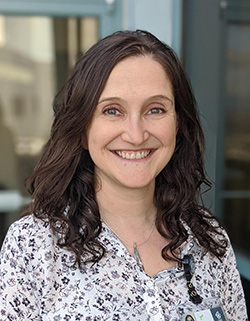
Director, OHSU Vasculitis Center
Assistant Professor of Medicine
Division of Arthritis & Rheumatic Disease
Research Summary:
Giant cell arteritis (GCA) is the most common form of vasculitis in adults over age 50. Left untreated, this disease can lead to permanent vision loss, strokes, and death. Treating GCA requires years of high-dose corticosteroids and other immunosuppressive agents, which have serious side effects in older adults. However, despite the risks of a missed diagnosis and the toxicity of treatment, current diagnostic tests for GCA are notoriously insensitive or nonspecific.
Endothelial cells (ECs) are highly immunologically active cells, which line the blood vessel wall and regulate transmigration of circulating leukocytes. Together with her mentors in rheumatology and cardiovascular disease, Dr. Jim Rosenbaum and Dr. Nabil Alkayed, Marcia Friedman is investigating EC signatures in blood and biopsy tissue of patients with GCA. Through this work she seeks to determine whether ECs can serve as a novel biomarker for GCA. Marcia Friedman also serves as the director of the OHSU Vasculitis Center, where she cares for patients with many forms of systemic vasculitis.
Recent Publications:
Friedman MA, Choi D, Planck SR, Rosenbaum JT, Sibley CH. Gene Expression Pathways across Multiple Tissues in Antineutrophil Cytoplasmic Antibody-associated Vasculitis Reveal Core Pathways of Disease Pathology. J Rheumatol. 2019;46(6):609–615. doi:10.3899/jrheum.180455
Ortega-Loayza AG, Friedman MA, Greiling TM, Cassidy PB, Marzano AV, Gao L, Fei SS, Liu Y, Simpson EL, Rosenbaum JT. Insights into pyoderma gangrenosum: potential use of gene expression profiling for pathogenesis and diagnosis. J Invest Dermatol. 2020. Under review.
Friedman MA, Choi D, Desmarais J, Seifer D, Le B, Ogle K, Harrington CA, Stevens J, Jackson P, Rosenbaum JT. Tofacitinib as a steroid-sparing therapy in pulmonary sarcoidosis: Two prospective cases and molecular analysis. Under review.
Fiscal Year 2021
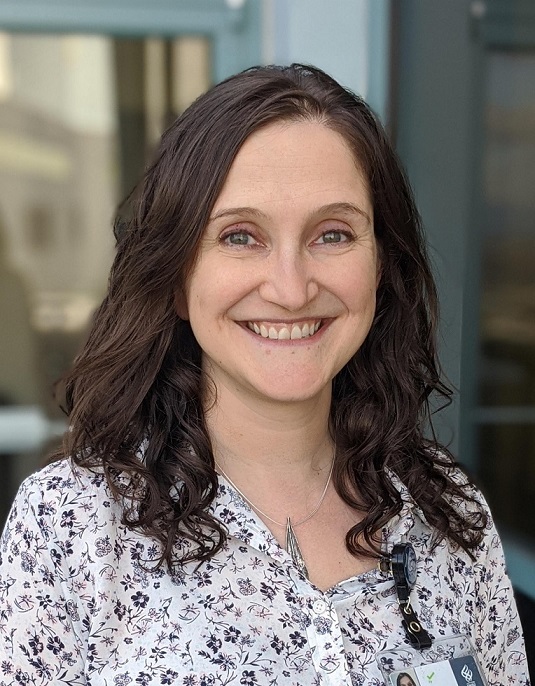
Marcia A. Friedman, M.D.
Director, OHSU Vasculitis Center
Assistant Professor of Medicine
Division of Arthritis & Rheumatic Disease
Research Summary:
Giant cell arteritis (GCA) is the most common form of vasculitis in adults over age 50. Left untreated, this disease can lead to permanent vision loss, strokes, and death. Treating GCA requires years of high-dose corticosteroids and other immunosuppressive agents, which have serious side effects in older adults. However, despite the risks of a missed diagnosis and the toxicity of treatment, current diagnostic tests for GCA are notoriously insensitive or nonspecific.
Endothelial cells (ECs) are highly immunologically active cells, which line the blood vessel wall and regulate transmigration of circulating leukocytes. Together with her mentors in rheumatology and cardiovascular disease, Dr. Jim Rosenbaum and Dr. Nabil Alkayed, Marcia Friedman is investigating EC signatures in blood and biopsy tissue of patients with GCA. Through this work she seeks to determine whether ECs can serve as a novel biomarker for GCA. Marcia Friedman also serves as the director of the OHSU Vasculitis Center, where she cares for patients with many forms of systemic vasculitis.
Recent Publications:
Friedman MA, Choi D, Planck SR, Rosenbaum JT, Sibley CH. Gene Expression Pathways across Multiple Tissues in Antineutrophil Cytoplasmic Antibody-associated Vasculitis Reveal Core Pathways of Disease Pathology. J Rheumatol. 2019;46(6):609–615. doi:10.3899/jrheum.180455
Ortega-Loayza AG, Friedman MA, Greiling TM, Cassidy PB, Marzano AV, Gao L, Fei SS, Liu Y, Simpson EL, Rosenbaum JT. Insights into pyoderma gangrenosum: potential use of gene expression profiling for pathogenesis and diagnosis. J Invest Dermatol. 2020. Under review.
Friedman MA, Choi D, Desmarais J, Seifer D, Le B, Ogle K, Harrington CA, Stevens J, Jackson P, Rosenbaum JT. Tofacitinib as a steroid-sparing therapy in pulmonary sarcoidosis: Two prospective cases and molecular analysis. Under review.
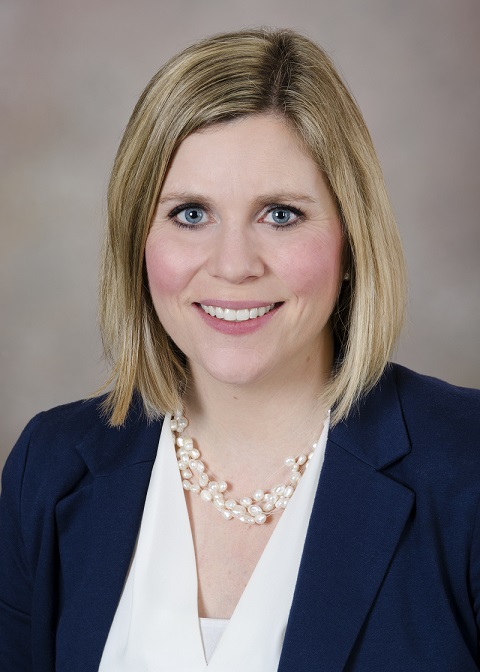
Dr. Vranas' long-term goal is to become an independent physician scientist focused on improving the quality, experience, and value of care delivered to patients hospitalized with acute respiratory failure through the study, design, and implementation of innovative care delivery processes. She was previously a fellow at Stanford University's Clinical Excellence Research Center (CERC), the first university-based research center dedicated to the discovery of scalable methods of high-quality healthcare delivery that decrease population-wide health spending. While at CERC, she studied the main cost drivers in critical care, interacted with industry leaders across multiple healthcare systems, and traveled in the United States and abroad to observe innovations in critical care delivery systems. She also gained exposure to positive-deviance research methods and Human Centered Design Thinking, a systematic approach used to develop innovative, feasible solutions to problems within the context and constraints of particular situations.
These experiences have been foundational in Dr. Vranas' career as a physician scientist and critical care health services researcher. As a K12 scholar, Dr. Vranas used a machine learning approach to identify subgroups of ICU patients with similar clinical trajectories in order to tailor care delivery platforms around their shared needs. She then performed a study that identified ICU-level factors associated with improved outcomes among ICU patients at low risk of dying, who represent an important target in efforts to improve the overall value of ICU care. Most recently, she completed a study evaluating the association of Physician Orders for Life-Sustaining Treatment with healthcare resource utilization among patients presenting to the emergency department.
Most recently, Dr. Vranas was awarded a VA career development award that will use a positive-deviance approach and Human-Centered Design Thinking to examine organizational factors and care processes associated with ICU admitting practices and outcomes among patients presenting to the emergency department with acute respiratory failure who do not require life support. Through this research, she hopes to generate new knowledge that will inform future clinical trials of triage strategies for patients with acute respiratory failure that are sensitive to hospital-specific environments and tailored to different risk groups. Results of this work will also guide hospital administrators and policy makers in decisions about how to best use critical care services and other valuable hospital resources in the context of their local environment.
Recent publications:
- Vranas KC, Jopling J, Sweeney T, Ramsey M, Milstein A, Slatore CG, Escobar G, Liu V. Identifying distinct subgroups of intensive care unit patients: a machine learning approach. Crit Care Med 2017 Oct;45(10):1607-1615.
- Vranas KC, Jopling J, Scott JY, Badawi O, Harhay MO, Ramsey MC, Slatore CG, Breslow M, Milstein AS, Kerlin MP. The Association of ICU Acuity with Outcomes of ICU Patients at Low Risk of Dying. Crit Care Med 2018 Mar;46(3):347-353.
- Vranas KC, Lin A, Zive D, Tolle S, Halpern SD, Slatore CG, Newgard C, Lee R, Kross E, Sullivan DR. The Association of POLST with Intensity of Treatment Among Patients Presenting to the Emergency Department. Ann Emerg Med 2019 Jun 24 [Epub ahead of print].
- Vranas KC, Ouyang D, Lin AL, Slatore CG, Sullivan DR, Kerlin MP, Liu KD, Baron RM, Calfee CS, Ware LB, Halpern SD, Matthay MA, Herridge M, Mehta S, Rogers AJ. Gender Differences in Authorship of Critical Care Literature. Am J Respir Crit Care Med. 2020 Jan 22. doi: 10.1164/rccm.201910-1957OC. [Epub ahead of print]
- Lee RY, Brumback LB, Sathitratanacheewin S, Lober WB, Modes ME, Lynch YT, Sibley J, Vranas KC, Sullivan DR, Engelberg RA, Curtis JR, Kross EK. POLST-Discordant Intensive Care Near the End of Life: A Retrospective Cohort Study. JAMA 2020 (in press).
- Vranas KC, Scott JY, Badawi O, Harhay MO, Slatore CG, Sullivan DR, Kerlin MP. The Association of ICU Acuity with Adherence to Evidence-Based Practices. Chest 2020. (in press)
Dr. Brian Chan is an assistant professor of medicine at OHSU Department of Medicine, division of general internal medicine and geriatrics and addiction medicine section. His primary research interest is to develop and evaluate clinical innovations to improve care for medically and socially complex patients, including those with substance use disorders. He conducts community partnered research with Central City Concern, a nationally recognized healthcare for the homeless Federally Qualified Health Center, and employs clinical trial, observational, and qualitative research methods. He is currently the recipient of an Agency for Healthcare Research and Quality (AHRQ) Patient Centered Outcomes Research (PCOR) K12 award to evaluate a novel integrated primary care model (SUMMIT) to improve outcomes for medically and socially complex patient populations with substance use disorder. His career goal is to develop methods for using readily available data to inform targeting and development of clinical interventions to improve substance use care for complex patients, and has submitted a career development award to the National Institutes of Health (NIH) to support his transition to research independence.
Selected publications:
- Chan B, Edwards ST, Nicolaidis C, Kansagara D, Korthuis T, Saha S. The SUMMIT Ambulatory-ICU Primary Care Model for Medically and Socially Complex Patients in an Urban Federally Qualified Health Center: Study Design and Rationale. Addiction Science and Clinical Practice: 2018 Dec. 2018 Dec; 13(1):27 PMCID: PMC6295087
- Chan B, Hulen E, Edwards ST, Mitchell M, Nicolaidis C, Saha S. “It’s Like Riding Out the Chaos”: Perspectives of Clinicians and Staff on Caring for High-Needs, High-Cost Patients in the SUMMIT Ambulatory Intensive Care Trial. Annals of Family Medicine: 2019 Nov; 17(6):495-501 PMCID: PMC6846277
- Chan B, Goldman L, Sarkar U, Guzman D, Critchfield J, Saha S, Kushel M. High perceived social support protects against 30-day hospital readmission in a multi-ethnic, limited english proficiency, safety-net population. BMC Health Services Research: 2019 May; 19(1): 334. PMCID: 6534878
- Chan B, Kondo K, Ayers C, Freeman M, Montgomery J, Paynter R, and Kansagara D. Pharmacotherapy for methamphetamine/amphetamine use disorder- a systematic review and meta-analysis. Addiction: 2019 Jul 22 [Epub ahead of print]. PMID:31328345
Fiscal Year 2020
Dr. Brian Chan is an assistant professor of medicine at OHSU Department of Medicine, division of general internal medicine and geriatrics and addiction medicine section. His primary research interest is to develop and evaluate clinical innovations to improve care for medically and socially complex patients, including those with substance use disorders. He conducts community partnered research with Central City Concern, a nationally recognized healthcare for the homeless Federally Qualified Health Center, and employs clinical trial, observational, and qualitative research methods. He is currently the recipient of an Agency for Healthcare Research and Quality (AHRQ) Patient Centered Outcomes Research (PCOR) K12 award to evaluate a novel integrated primary care model (SUMMIT) to improve outcomes for medically and socially complex patient populations with substance use disorder. His career goal is to develop methods for using readily available data to inform targeting and development of clinical interventions to improve substance use care for complex patients, and has submitted a career development award to the National Institutes of Health (NIH) to support his transition to research independence.
Selected publications:
- Chan B, Edwards ST, Nicolaidis C, Kansagara D, Korthuis T, Saha S. The SUMMIT Ambulatory-ICU Primary Care Model for Medically and Socially Complex Patients in an Urban Federally Qualified Health Center: Study Design and Rationale. Addiction Science and Clinical Practice: 2018 Dec. 2018 Dec; 13(1):27 PMCID: PMC6295087
- Chan B, Hulen E, Edwards ST, Mitchell M, Nicolaidis C, Saha S. “It’s Like Riding Out the Chaos”: Perspectives of Clinicians and Staff on Caring for High-Needs, High-Cost Patients in the SUMMIT Ambulatory Intensive Care Trial. Annals of Family Medicine: 2019 Nov; 17(6):495-501 PMCID: PMC6846277
- Chan B, Goldman L, Sarkar U, Guzman D, Critchfield J, Saha S, Kushel M. High perceived social support protects against 30-day hospital readmission in a multi-ethnic, limited english proficiency, safety-net population. BMC Health Services Research: 2019 May; 19(1): 334. PMCID: 6534878
- Chan B, Kondo K, Ayers C, Freeman M, Montgomery J, Paynter R, and Kansagara D. Pharmacotherapy for methamphetamine/amphetamine use disorder- a systematic review and meta-analysis. Addiction: 2019 Jul 22 [Epub ahead of print]. PMID:31328345